
This is the number one question I get asked by students.
Students want to know the exact numbers (e.g. 1, 2 or 3 hours).
Well, I’ve thought long and hard about this question and I’ve come to the following conclusion:
Focus on the quality of your study (not the quantity of study).
Sure, I know one school advises students to engage in 20 minutes of study per subject every day. Another school recommends 3 hours a night, plus 8 hours over the weekend …
So I could easily just tell you, Study for 3 hours every day! but that doesn’t sit right with me.
When I was in high school, I’d re-read my books and highlight my notes for 3 hours after school. I’d tick the 3 hour study box. Boom! Done! Finally, I can relax!, I’d think.
But after completing 3 hours of study, how much had I actually learnt?
How much of the content did I actually understand?
I didn’t realise at the time but my study strategies were totally ineffective.
So even though I could tick the 3 hour study box, I hadn’t managed to achieve much in that time.
We’re either:
A) not studying effectively;
B) just faffing around (i.e. multitasking); or
C) a combination of A and B.
When you study ineffectively and/or faff around for 3 hours, you’re wasting time you’ll never get back.
Let’s not overlook the fact that thinking you have to do a huge chunk of study can totally throw you off course. It can lead to procrastination and study paralysis.
The thought of three hours of study is simply too overwhelming for a fatigued brain that’s already spent 6-7 hours at school. Consider that after school your frazzled brain is thinking:
You want me to do another 3 hours on top of that? You’re dreaming!
With a fixed 3 hour study rule, you run the risk of falling into the trap of all or nothing thinking.
Last year I was setting up for a school presentation when I overheard a student say:
I’ll either do the 3 hours of study and if I think I can’t then I think ‘Why even bother?’ So I just sit there and look at the wall.
I wanted to say to this student:
Please don’t stare at the wall. Do something. Even just 15-20 minutes.
Sometimes we can forget that doing something is always better than doing nothing.
This is why I recommend you create your own set of study guidelines. These will be guidelines that motivate you to study (and not have you staring at the wall for several hours).
Yes, you still need to study those painful subjects. The reality is studying is the only way you’ll effectively encode information (i.e. move information from your working memory to your long-term memory).
But the focus needs to shift from quantity of study to quality of study.
Not sure what quality study looks like?
Here are some examples:
The great thing about taking the quality study approach is that you learn and understand more in less time. This means more free time for you to do fun stuff.
If you choose to engage in quality study (i.e. you use effective study strategies and eliminate distractions from the outset), you’ll save time, feel less stressed and more in control of your studies.
So if you find yourself thinking Why should I even bother if I can’t do 3 hours of study?, remind yourself that doing some quality study (even just 25 minutes) is better than 3 hours of faffing around. All those small chunks of quality study add up to something really solid.
Take a moment to think of one small action you’ll take today to improve the quality of your study sessions. Feel free to post what you plan to do below!
Share This:

While I always kept an eye on the amount of petrol in the tank, I also needed to pay close attention to my own personal energy levels.
It was important to avoid pushing myself past empty and depleting my energy reserves because if I did, I would end up feeling emotionally wrecked.
I clearly remember one day when I pushed myself too hard. Looking back, it seems comical now. But I wasn’t laughing at the time.
It was my 24th birthday. I had woken up that morning with great intentions, thinking “It’s my birthday! Let’s make it a great day!”
I was trying too hard to make it a “great day”. I was forcing it, and perhaps that’s partly why everything went pear-shaped. Here’s what happened . . .
I had a school presentation later that day, so I spent the morning preparing for it before driving over an hour to deliver the presentation.
The time slot for the talk wasn’t ideal—my talk was scheduled for the last period on a Friday afternoon—but I was thinking, “Hey! It’s my birthday. Let’s make it a great day!”
What can I say?
The session didn’t go well.
There were IT issues and the students’ minds were elsewhere. But you couldn’t blame the students. They were tired and I was the only thing standing between them and the weekend.
When I wrapped up the session, I felt tired and hungry.
But I foolishly ignored my body’s needs. On an empty stomach, I began the long drive home. I was desperate to get back and be in my own space.
Within 10 minutes, I found myself stuck in peak-hour traffic. But I wasn’t just stuck in traffic; I was also stuck in an anxiety loop.
Psychologist Risa Williams explains an anxiety loop as “a negative thought cycle that makes you feel stuck in a rut”. You can’t rationalise your way out of an anxiety loop. Logic doesn’t cut it.
I kept thinking about how the talk could have gone better, why my birthday had been such a flop . . . these annoying tunes kept playing over and over in my mind and they kept getting louder and louder.
I was about halfway home when something unexpected happened: I began sobbing uncontrollably behind the wheel of my car. I just felt incredibly sad.

I realised it was dangerous to drive while crying, so I pulled over and called my mum.
My mum and I would chat on the phone most days, but I remember this conversation especially well because my mum didn’t pull any punches.
Mum: What’s wrong Jane? Why are you upset?
Me: It’s my birthday and I wanted to have a great day but I just feel so awful. Everything has gone wrong today. The day has been a total flop.
Mum: Jane, have you had anything to eat?
Me: No.
Mum: You’re hungry! I know what you’re like when you’re hungry. You need to find a place to eat.
Me: But there’s nothing healthy to eat around here . . . there are no healthy options.
Mum: I don’t care. Order something. Anything. You need to eat. Go do that right now!
I found a café that was still open (it was 3:30pm) and ordered a burger from the menu.
When the burger came out 10 minutes later, I felt emotionally wrecked.
But after eating that big, juicy burger, I felt instantly better.

The world now felt like a new and different place. I had strength again. With tear-free eyes, a calm mind, and more energy in my system, I got in my car and drove myself home safely.
That experience taught me an important lesson. I learnt I had to stop pushing myself past the point of empty (something I’d done far too often for too many years).
I had to start listening to my body and the signals it was sending me.
Feeling hungry? Have a healthy snack.
Tired? Take a quick nap.
Thirsty? Have a few sips of water.
Sitting for too long and in pain? Get up and move.
Eyes and brain hurting from staring at a screen for too long? Take a break and look out the window.
It also taught me how engaging in small behaviours (tiny habits) can significantly impact how you think and feel.
All of these habits are designed to boost and conserve my energy. That’s the great thing about habits: they conserve your energy by automating your behaviour and combating decision fatigue. As Kevin Kelly states in his book Excellent Advice for Living:
“The purpose of a habit is to remove that action from self-negotiation. You no longer expend energy deciding whether to do it. You just do it.”

These 15 tiny habits are so deeply ingrained that I do all of them most days. I don’t waste time and energy thinking, “Should I go on the treadmill or stay in bed and read a book?” or “Do I do my gratitude practice or eat breakfast?” I have established a routine of healthy behaviours that work for me.
These tiny habits don’t take long to do, and best of all, they stop me from running out of energy and crashing. I also haven’t been sick in over three years (mainly due to Habit #13: Wearing a n95 mask).
You might be wondering why I’m still wearing a mask when covid restrictions have eased. There are a few reasons: I know several people with long covid (and they are suffering). Their quality of life is not what it once was.
I’ve also read a lot of the research on covid. Research shows covid can cause significant changes in brain structure and function.
This study found that people who had a mild covid infection showed cognitive decline equivalent to a three-point loss in IQ and reinfection resulted in an additional two-point loss in IQ.
Other studies have found covid can disrupt the blood brain barrier and cause inflammation of the brain. Since I rely on my brain to do everything, wearing a n95 mask (not a cloth or surgical mask) is a simple and effective habit I’m happy to keep up to protect my brain and body.
At the end of the day, cultivating healthy habits is about noticing the little (and big) things that make a difference and then experimenting with those things.
For example, Habit #3 (Moving on a treadmill first thing every morning) came about when I noticed the dramatic difference in how I felt on the days I ran on the treadmill compared to the days I didn’t (I felt mildly depressed on the days when I didn’t go for a run).
Habit #4 emerged after I noticed that eating a particular breakfast (overnight oats with berries) made me feel amazingly good compared to having a smoothie or a bowl of processed cereal for breakfast (which would spike my blood sugar levels).
Your health influences everything in life—and I mean absolutely everything. It influences how you interact with the people in your life, how well you learn and focus, your energy levels, and how you do your work.
As Robin Sharma explains in his book The Wealth Money Can’t Buy, health is a form of wealth.

Sharma writes:
“If you don’t feel good physically, mentally, emotionally, and spiritually, all the money, possessions and fame in the world mean nothing. Lose your wellness (which I pray you never will) and I promise you that you’ll spend the rest of your days trying to get it back.”
One way you can build your wealth is by cultivating tiny healthy habits.
As I think back to my younger self, 24 years old and ignoring the warning signs my body was sending me, I can’t help but feel a bit embarrassed. But as Kevin Kelly says, “If you are not embarrassed by your past self, you have probably not grown up”.
I’ve grown up a lot. I’ve come to realise developing awareness and taking time out to step back and reflect are critical to living a healthy, grounded life. When you notice what makes you feel good and not so good, you can make tiny tweaks to improve your life.
If you aim to do more of the things that leave you feeling good and less of the things that leave you feeling depleted and fatigued, you can’t really go wrong.
In the words of Psychologist Dr Faith Harper, “Keeping our brains healthy and holding centre is a radical act of self-care”.
On that note, take a moment to check in with your body. What does it need right now? Could you do something small to treat your body and mind with a little more care? Step away from the screen and do it now.
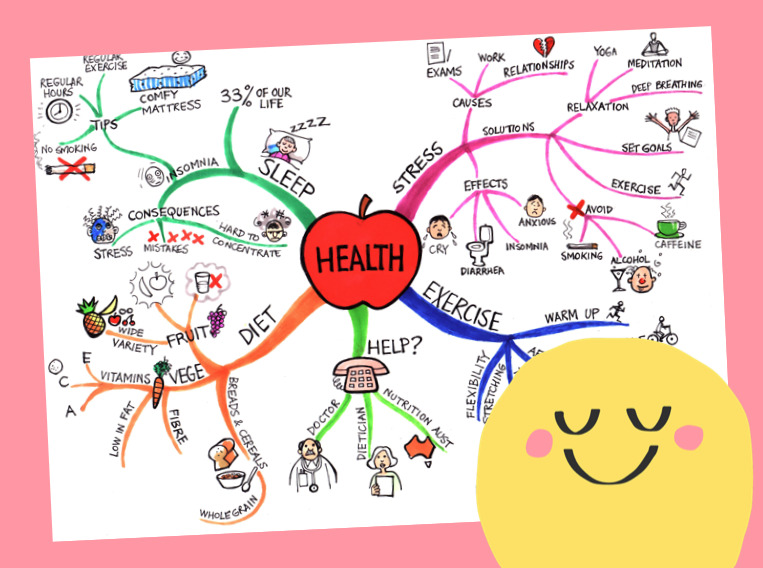
When you start using this strategy, it can feel clunky and awkward. It requires some mental effort to get going.
Why can it feel hard to start mind mapping?
Because it isn’t a habit (not yet, anyway). But once mind mapping becomes a habit, it can feel easy and deeply rewarding.
So, how do you get to that point where mind mapping feels easy? Even fun?
In this article, I will explore how you can create a habit of mind mapping. I’ll show you how to remove friction or pain points so it’s much easier to put pen to paper and absorb ideas.
Let’s start by looking at what gets in the way and stops many people from creating mind maps in the first place. I’ll also share some strategies you can use to overcome each of these barriers.

When you look at a mind map with all the pictures and different colours, it seems like something that would take a fair amount of time and effort to create.
If you’re comparing mind mapping to the time it takes to read your book passively, then yes, mind mapping will take more time. But you need to understand that reading your book passively is not an effective way to learn. In contrast, mind mapping is super effective.
People often fall into the trap of trying to make their mind maps look like works of art. Try lowering your standards and allowing yourself to make a mess when you mind map. This will speed up the process.
Another time trap is trying to mind map as you read and trying to mind map everything you read. I find it’s much faster to read and tab key ideas worth mind mapping later on. Once I’ve finished reading either the chapter or book, I then commence the mind mapping process. By this stage, I have a better understanding of the key ideas and what’s worth mind mapping.
Some people get hung up on the way their mind maps look. They can’t stand looking at messy pictures and scribbled words. If that’s you, perhaps you could take your drawing skills to the next level with some practice and sketch classes. But it’s not necessary.
Mind maps are not there to look pretty. They are there to help you learn. I am a big fan of badly drawn mind maps. If you look at my mind maps from university, they’re not works of art but they contain loads of important ideas. And that’s what matters most when it comes to learning.
Here’s a simple hack: invest in a set of nice, vibrant coloured pens. A bit of colour on the page will make your mind maps more visually appealing.

Mind mapping is straightforward. You draw a central image, curved lines, a few pictures, and write down key ideas. That’s it!
It’s not something you need to read a book about. You don’t need to enrol in a 10 week program to learn how to do this.
If you want some tips on how to mind map, check out my free Mind Mapper’s Toolkit. It’s a quick and easy read.
It’s important to realise that the first time you engage in any new behaviour, it will most likely feel strange and uncomfortable. You may feel a bit clumsy and awkward. You may have questions, “Am I doing this right?”. All of this is normal and to be expected.
Even something as simple as the pen you mind map with can make or break the mind mapping process.
You’ve probably noticed that some pens don’t feel pleasant to write or draw with. For instance, I’m not a fan of the popular Sharpie pen range. I don’t like the way these pens bleed through the page. And I really don’t like the way they smell.
These may seem like minor irritations and quirks, but trust me, they’re not. Your mind mapping experience will be diminished by a pen that doesn’t feel good in your hand or on the page. And any behaviour that feels unpleasant is much harder to sustain.
I’ve since ditched my Sharpie pens. I mind map with a uniball signo pen and non-toxic Tombow paintbrush pens. As far as coloured pens go, I won’t lie, these pens are pricey! But you can find them online for $25 cheaper than in Officeworks (a big stationery store in Australia).
What I love about these pens is that they are super easy to use, feel lovely to strike across the page, and they won’t leave you with a splitting headache from the ink smell.
Here are some things that have helped me to establish this habit in my life:
When is the best time for you to mind map? Where in your day can you easily slot in a 15 minute mind mapping session?
I like to mind map when I feel fresh and mentally alert (first thing in the morning).
Find an activity that you do every day without fail (e.g., having a shower, eating breakfast or dinner) and use that to prompt you to start a mind mapping session.
For instance, after I have completed my morning routine (workout, breakfast and shower), that’s my cue to sit down and start mind mapping.
Before you start your session, set yourself up with everything you need to mind map. I like doing this the night before my morning mind mapping sessions.
Before I go to bed, I lay out a sheet of A3 paper, my pens, and my timer. The book I am mind mapping is open on the page where I need to start working. The next day, all I need to do is sit down, start my timer, pick up a pen, and away I go!

What’s one thing that can slow down the mind mapping process?
For me, it’s digital distractions (e.g., text messages and notifications).
You probably already know the things that tend to derail you. Create a barrier between you and those things.
For example, my phone is the biggest distraction for me. How do I deal with this? Before I start mind mapping, I take my phone and place it away from my body in another room.
This signals to my brain that my phone is off-limits and it’s time to knuckle down and focus on my work.

Don’t wait until you feel pumped and inspired to create a mind map. Set a timer for 10-15 minutes and start mind mapping (regardless of how you feel).
If you miss a day, don’t beat yourself up. It’s no big deal. Just say to yourself, “Tomorrow is a new day. I will get back into mind mapping then”.

When the timer goes off at the end of your mind mapping session, say to yourself, “Good job!”. Do anything that makes you feel instantly good. I often clap my hands or do a fist pump.
According to Professor BJ Fogg, the secret to wiring in any new habit is to release a positive emotion within milliseconds of engaging in the new behaviour. When you release positive emotions, this releases dopamine in your brain. This makes it more likely that you’ll engage in this behaviour again.

I mentioned this before, but it’s important to repeat it: don’t go cheap with your mind mapping tools. Invest in good pens and paper. My favourite pens for mind mapping are uniball signo pens (0.7 tip) and Tombow paintbrush pens. Regarding paper, I love using Rhodia paper (it feels like your mind mapping on butter).
It may sound a little dramatic, but mind mapping changed my life. I used to read books and then feel frustrated that I couldn’t retain much information. But now, I have a strategy I can easily use to help me understand and remember complex ideas. This gives me confidence when it comes to learning new skills and information.
I encourage you to be playful with this strategy. Don’t get too hung up on how your drawings look. Your top priority is to leave perfectionism at the door and have some fun. Because when it comes to mind mapping, done is better than perfect.
Years ago, I was gifted a treadmill.
Within days of receiving this treadmill, I had converted it into a walking desk. I was super excited by the possibility of walking and working simultaneously (one form of multitasking I’m totally fine with).
I had visions of myself walking and working with supercharged productivity. I thought, “Nothing is going to stop me!”.
But despite my best intentions, I struggled to use this treadmill desk. I couldn’t make walking and working part of my daily routine.
I’m embarrassed to admit that this treadmill just sat there collecting dust for years.
Occasionally, I would hop on the treadmill to practice my presentations (10 minutes here and there), but this was not a solid part of my daily routine like I had hoped it would be.
It wasn’t a lack of information. I was fully aware of the benefits of movement for learning.
I had read dozens of books and research papers that provided solid evidence for the benefits of incorporating movement into the day.
For example, the Stanford university research study called Give your ideas some legs showed that people who walked generated more creative ideas than those who sat.
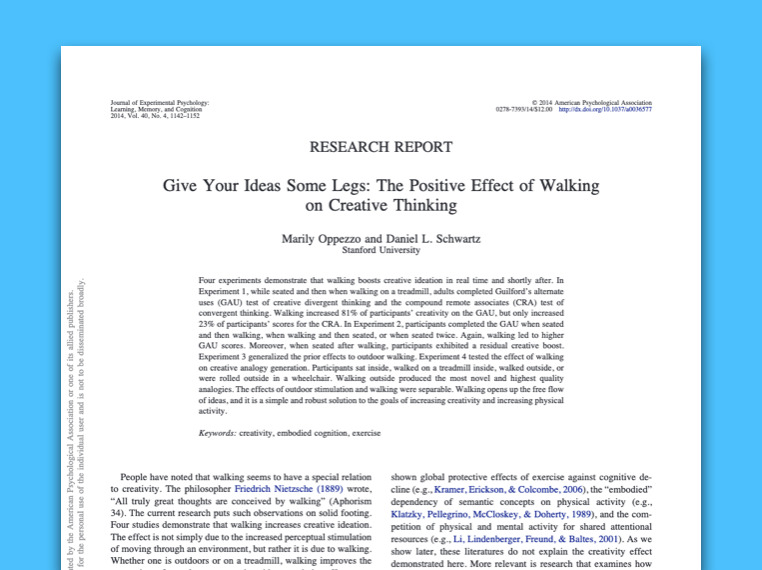
I had also experienced firsthand the powerful benefits of movement: it made me feel better, stronger, and mentally sharper.
Something else was getting in the way.
So, I asked myself what Professor BJ Fogg would call the Discovery Question:
What is making this behaviour (i.e., walking and working at my treadmill desk) hard to do?
In his book Tiny Habits, Behavior Design expert Professor BJ Fogg argues if you’re struggling to engage in a particular behaviour, it will be due to one of five factors: 1) Time, 2) Money, 3) Physical effort, 4) Mental effort, and 5) Routine.
He calls these five factors the Ability Chain.
To pinpoint where you are stuck with adopting a new behaviour, Professor Fogg recommends asking the following questions:
• Do you have enough time to do the behaviour?
• Do you have enough money to do the behaviour?
• Are you physically capable of doing the behaviour?
• Does the behaviour require a lot of creative or mental energy?
• Does the behaviour fit into your current routine, or does it require you to make some adjustments?
Professor Fogg states:
“Your ability chain is only as strong as its weakest Ability Factor link.”
It was the physical effort link.
My problem was that I was walking way too fast on my treadmill, which caused my legs to fatigue quickly.
I also felt uncomfortable having to look down at my small laptop screen.
After asking the discovery question, it became clear why this habit had not stuck: I felt awkward and clumsy using my treadmill desk.
But it also became apparent that I could strengthen this weak link by making simple adjustments.
I then asked myself this question:
What could make using my treadmill desk easier to do?
I brainstormed ways to improve my treadmill desk (How could I make it easier to walk and work simultaneously?). With a bit of experimentation and a playful mindset, I was amazed that after years of this treadmill collecting dust, I was finally using it regularly.
I experienced what author Jenny Blake would call a nonlinear breakthrough (NBL).
In her book Free Time, Blake describes a non-linear breakthrough as “an unexpected sharp turn of clarity or success, rather than a linear, long, or otherwise time-consuming analysis or slog”.

This habit of using my treadmill desk was wired in quickly, easily, and joyfully.
If you’re interested in using a treadmill desk and feeling less exhausted at the end of the day, I recommend trying the following things.

Like any new habit, start small. If you’re used to sitting all day, this transition will take some time. Most people would struggle to go from sitting to walking all day. My advice is to ease into it.
Start by doing mini treadmill work sessions (15-30 minutes or whatever you can manage) and gradually build your way up to longer sessions (1 hour).
In the first couple of weeks of developing this habit, I used my treadmill desk in the morning for 2 to 3 hours and then gave myself permission to use my sit-stand desk in the afternoon.
As I became more confident walking and working, I replaced more sit-stand sessions with treadmill desk sessions. The treadmill desk is now my main workstation and the sit-stand desk is rarely used.

Comfort is king. Anyone who works in a job where they are on their feet all day will tell you that comfortable shoes are an absolute must. Don’t skimp on good shoes.
I went to a sports store and purchased a pair of running shoes that provided excellent support and made my feet feel good all day. I live in these shoes now, and they make walking and working easier and more enjoyable.
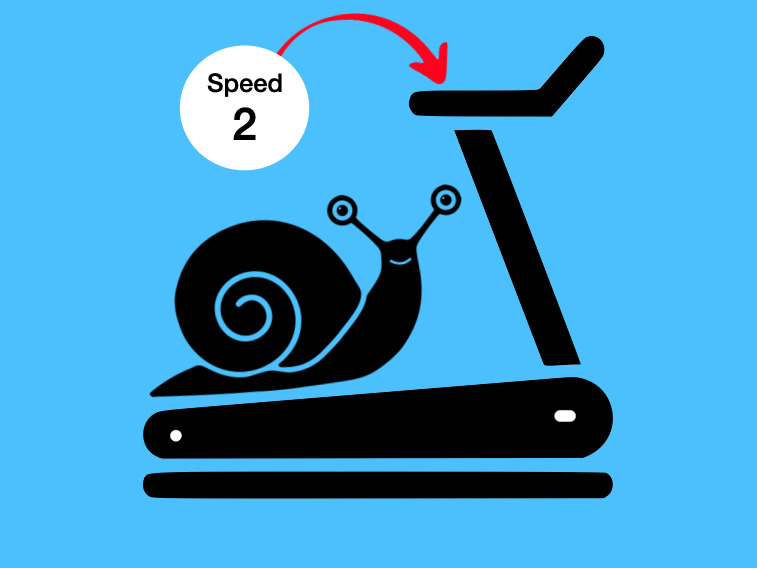
I’m a fast walker. But it’s difficult (and tiring) to walk and work at a fast pace. You can’t sustain that pace all day. It’s also hard to type and focus on your work when power walking.
I read in online forums that professional treadmill desks (not DIY ones like mine) are programmed to go at a slow pace. This is a deliberate design decision. The slow pace is not only for your safety but also so you can sustain the habit of walking and working for a long time.
I’ve had to learn to slow down (not just at my treadmill desk but in all areas of my life). Once I recalibrated to walking at a much slower pace, I could sustain this habit of working in this new way.
Some days, you’re going to have more energy than others. If you’ve been walking for 30 minutes and feel like your legs need a break, give yourself permission to take a break.
Using a treadmill desk shouldn’t feel like a chore. It should be viewed as an activity that makes you feel more alert and energised. Using a treadmill desk (even a budget homemade one) is a privilege!
You need to get the ergonomics right to sustain the habit of using a treadmill desk. In other words, you need to be comfortable at your treadmill desk.
In hindsight, it’s obvious why I wasn’t using my treadmill desk for years: my setup wasn’t the best. I was looking at a tiny laptop screen with my neck craned and moving at a power walker’s pace.
I wasn’t comfortable, which meant I didn’t feel good.
And if you don’t feel good doing something, it’s much harder to sustain a particular behaviour. You may also end up with bigger problems down the track (e.g., bad posture and lower back problems).
A couple of years ago, I attempted to improve the ergonomics of my treadmill desk by placing a sit-stand desk on top of my existing desk. I also propped up a slightly bigger monitor on some books.
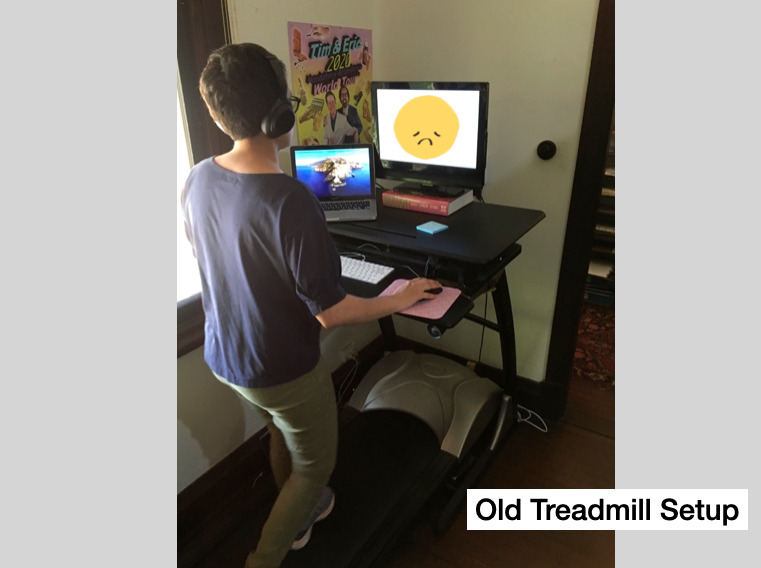
This setup turned out to be disappointing. My monitor would shake as I walked on the treadmill. The sit-stand desk also restricted my walking range on the treadmill belt. Again, this setup was far from ideal and the habit of using it didn’t stick.
A few months ago, while researching ways to improve my treadmill desk, I came across forum posts where people shared that they had mounted a monitor to their wall and used it with their treadmill desk. Bingo! Immediately, I knew this was the solution for me.
I jumped on Gumtree and found a secondhand large monitor and monitor bracket. This created more space on my desk for other items (paper, pen, and my stream deck).

Finally, I could say goodbye to terrible posture and squinting at tiny icons on a small laptop screen.
My treadmill desk also doubles as my high-intensity exercise station. Each morning, before I launch into my workday, I warm up my brain by doing a 20-30 minute walk + run to clear my mind and improve my mood.
When I first started doing these morning runs, I noticed whenever I reached high speeds, objects in the cupboard next to the treadmill would shake and sometimes fall off onto the treadmill belt, creating potential trip hazards.
To solve this problem, I got a roll of heavy-duty Bear tape and taped all the boxes to the shelves beside me. It may not look pretty, but it keeps all my items securely in place.
I noticed that as I ran on the treadmill, creative ideas would come to me out of nowhere. I needed a way to capture these ideas.
So, I turned my treadmill desk into a whiteboard. This cost $5. Here’s what I did . . .
I found a roll of whiteboard wallpaper at Officeworks (a big stationery shop in Australia) and covered my desk (an old plank of wood) with it.
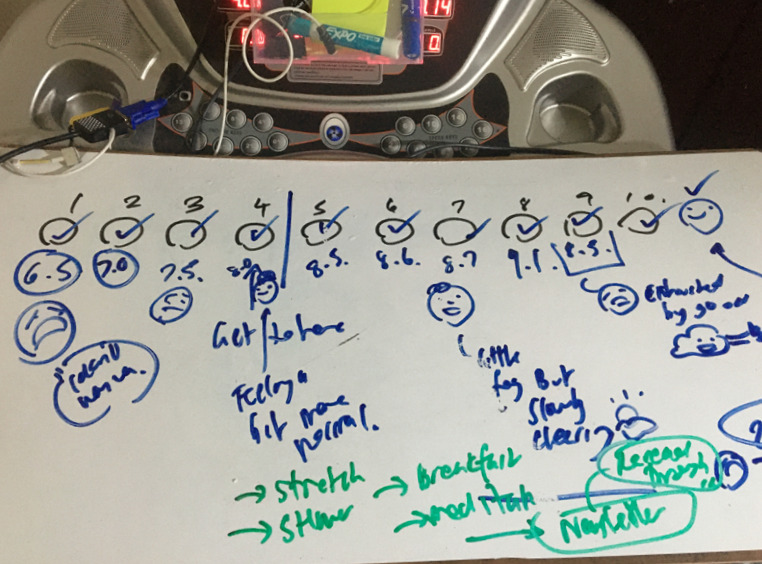
I also attached a plastic container to the treadmill that I found at the tip shop for $1. This container holds whiteboard markers, sticky notes, and pens.
Whenever an idea strikes, I get a whiteboard marker and write it on my desk. At the end of my run, I transfer any good ideas into my notebook.
Some people work and learn best when they move their bodies. I’m one of those people. If you’re like me and need to move, it is worth spending time getting your work set up right. The important thing is that you approach this with an open mind.
Some things will work, and some won’t. But keep tinkering and tweaking until you find a working setup, rhythm, and pace that feels good. You’ll be amazed by how much more energised and alert you feel when incorporating more movement into your day.
Dr Jane Genovese delivers interactive and engaging study skills sessions for Australian secondary schools. She has worked with thousands of secondary students, parents, teachers and lifelong learners over the past 15 years.
Get FREE study and life strategies by signing up to Dr Jane’s newsletter:
© 2025 Learning Fundamentals